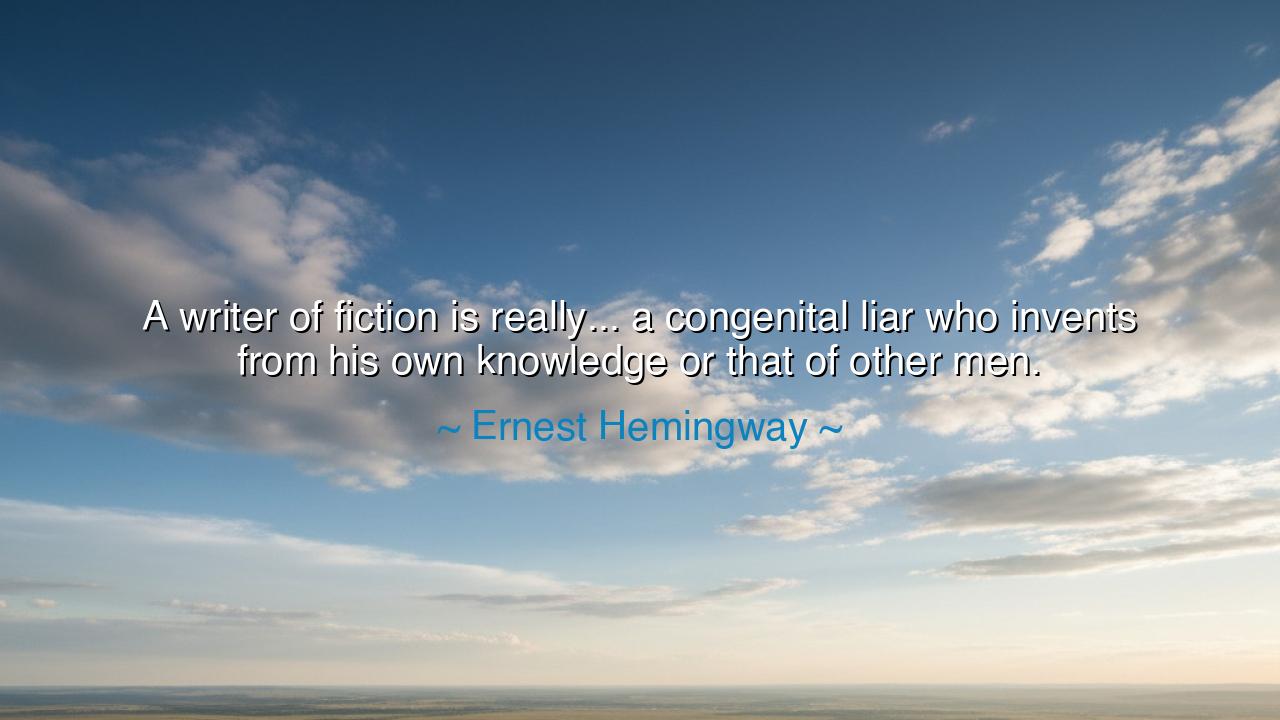
A writer of fiction is really... a congenital liar who invents
A writer of fiction is really... a congenital liar who invents from his own knowledge or that of other men.






Hear the words of Ernest Hemingway, master of prose and painter of truth through fiction, who declared: “A writer of fiction is really... a congenital liar who invents from his own knowledge or that of other men.” At first glance, this sounds like an insult, a dismissal of the noble art of storytelling. Yet hidden within this sharp jest lies a profound truth: that the fiction writer, though dealing in invention, does not abandon truth, but seeks it by other roads. He lies in order to reveal. He invents not to deceive, but to uncover the deeper realities of the human spirit.
The ancients knew this paradox well. Plato banished the poets from his Republic, declaring them dangerous liars, imitators of reality rather than speakers of truth. And yet, even as he wrote this, he himself used allegory, myth, and fable—the fiction of the cave, the chariot of the soul—to teach truths too deep for plain language. Thus it has always been: the storyteller appears to invent, but beneath the invention lies the marrow of human experience, drawn either from his own life or borrowed from the lives of others.
Hemingway himself lived by this paradox. He fought in wars, fished in seas, hunted in savannas, and from these experiences he drew raw materials. Yet his stories—though invented in detail—were true in spirit. The old man of the sea was not Hemingway himself, yet through him the writer told the truth of human struggle, resilience, and dignity. Here is what he meant: the writer is a liar in that he fabricates the events, but he is also a truth-teller in that he grounds them in the knowledge of life, whether his own or that of others.
Consider the story of Leo Tolstoy. The battles of War and Peace are fictional, but drawn from his knowledge of history and his own military service. The characters never walked the earth, yet their loves, fears, and longings are so real that readers across centuries have seen themselves within them. Tolstoy, like Hemingway, was a congenital liar by trade, yet his lies carried truths that no statistic, no chronicle, could reveal. Such is the power of the storyteller: to give flesh and breath to truths that are otherwise invisible.
The deeper wisdom of Hemingway’s jest is that the writer of fiction must be both thief and creator. He steals from his own heart and from the lives of those around him, gathering fragments of knowledge, speech, and experience. Then he rearranges them, disguises them, and sets them into motion within invented worlds. The lie is the cloak, but the truth is the body beneath it. Those who read feel this truth in their bones, even if the events never happened.
The lesson is clear: do not scorn fiction as falsehood. Recognize instead its ancient power to shape the soul. A fable may teach more deeply than a sermon, a novel may reveal more than a history book, a poem may pierce more sharply than a speech. Fiction is the art of lying in service of truth, invention born of knowledge, creation forged from memory and observation.
Practical action follows: if you write, do not fear invention. Take what you know—your own struggles, your own joys, or the stories of those around you—and weave them into tales. Do not worry if the details are “true” in the literal sense; seek instead to make them true in spirit. And if you read, do not dismiss fiction as entertainment alone. Listen for the truth within the lie, for there lies the wisdom the writer has hidden for you.
So remember always Hemingway’s jesting wisdom: a fiction writer is a congenital liar, yet his lies are the road to truth. Cherish the storytellers, for they are the guardians of hidden wisdom. Their inventions, drawn from life and memory, allow us to see ourselves more clearly, to know others more deeply, and to touch realities that plain facts can never reveal. For though they lie, they lie in the service of truth eternal.






AAdministratorAdministrator
Welcome, honored guests. Please leave a comment, we will respond soon